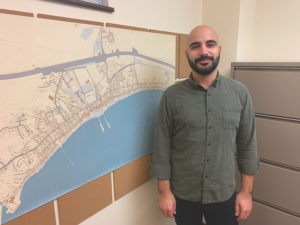
PROVINCETOWN — Town Planner Jeffrey Ribeiro is resigning from his job this week to become the Truro town planner next week.
The Truro position offers slightly more money, but according to Ribeiro that’s not the reason he’s moving — it’s that there are more interesting opportunities coming up in Truro. The Provincetown planner’s time is so completely consumed by the demands of permitting and development, he said, that there’s little left for the rest of his duties.
The town planner is liaison and technical adviser to the zoning board of appeals, the planning board, and the historic district commission, and in a town with as much ongoing development as Provincetown, Ribeiro said, that aspect of the job tends to box out all other work.
“The staff here in Provincetown is great — it’s not just a job for anyone here,” Ribeiro said. “People are really interested in the work they’re doing, and that doesn’t happen everywhere. We have a lot of Leslie Knopeses here,” said Ribeiro, referring to the amusingly overcommitted star of the NBC sitcom “Parks and Rec.”
“And we have great boards,” he added, “the amount of work they do, and the degree to which they care about the underlying issues — it makes it hard to leave. I’m not paying lip service here. They’re authentically great.”
But, he continued, he has little time for working on housing issues, developing the local comprehensive plan, or hearing from the public.
“I was able to do more of that kind of work at the Cape Cod Commission, where I was before, and I’ll be able to do more of that in Truro,” he said. “It’s part of the job description here, too, but there is so much permitting work coming in, and it’s got to happen first. It’s urgent. The important but not urgent stuff just hasn’t been possible.”
Ribeiro is excited about working in Truro because of both the land available and the people.
“There’s a great group of younger people in Truro who are starting to get involved in a bigger way,” he said. “A lot of them grew up there, and they’re really engaged. In fact, there’s a lot of opportunity in Truro to address problems that both towns share. Provincetown couldn’t have businesses without water from Truro, but Truro also wouldn’t be so attractive without all those restaurants nearby in Provincetown. The workforce, the communities are tied together in a lot of ways. They’re shared communities with shared problems, and there’s a lot of room to work together.”
Because of Truro’s larger lot sizes, the town could make good use of its accessory dwelling bylaw, Ribeiro said.
“There are areas that could become vibrant villages, and that’s a discussion the town is having,” he said. “The Walsh property is an almost unparalleled opportunity. I worked on something at the commission called conservation-based affordable housing. The idea is, with a large property, you don’t have to make it into all one or all the other. The Community Preservation Act sets it up so you can do some of both.”
Both Provincetown and Truro have had trouble getting their local comprehensive plan revisions off the ground. Provincetown finished its last LCP in 2000, and the rewrite that was begun in 2016 and then revived in 2018 is now “in a holding pattern,” Ribeiro said. “The Cape Cod Commission has just promulgated some new rules that make the process easier for towns to move through. There are several towns on the Cape that are struggling with this.”
Writing a local comprehensive plan involves multiple community meetings on a half-dozen major subjects, such as economic development, affordable housing, open space, community services, and historic preservation. This kind of work is catnip to an urban planner, but this is also the work that Ribeiro wasn’t able to do in Provincetown, due to the steady demands of permitting.
Asked if the position had grown too daunting for one person, Ribeiro hesitated.
“I don’t want to say that,” he said. “I will say this though: I think one amazing thing about Provincetown is the scale at which it’s willing to tackle problems. The Year-Round Rental Housing Trust is innovative, outside-the-box, and it’s going to last. On climate adaptation, I think we are way ahead. As a town, we want to do big things that other communities don’t do. We don’t always have enough people to do all of those things. People here in this office encounter that every day.”
